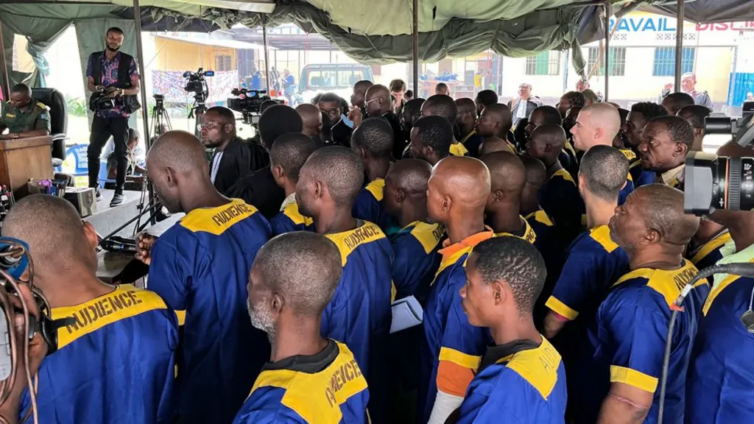The trial of 51 individuals, including three Americans, accused of attempting to overthrow the president of the Democratic Republic of Congo last month, has begun.
The hearing is being broadcast live on national TV and radio from N’dolo military prison in the capital, Kinshasa.
The defendants were ushered into the military court wearing blue-and-yellow shirts, marking their first appearance in public since the failed coup.
Arrested during attacks on the presidential palace and the home of an ally of President Félix Tshisekedi, they face multiple charges, including financing terrorism, murder and attempted assassination.
They have not yet been asked to plead in the case, which is being held under a marquee in the grounds of the jail.
The US State Department says it has not been given access to its citizens in custody.
Six people were killed during the attempted coup on 19 May, including the suspected leader of the plot Christian Malanga.
The rest of the defendants were detained after the attack on the Palais de la Nation and the home of Vital Kamerhe, who is the parliamentary speaker.
Local media reports said the assailants were members of the New Zaire Movement linked to Malanga, a formerly exiled DR Congo politician who had acquired US citizenship.
His son Marcel Malanga is among the US nationals who were arrested.
Another is 21-year-old Tyler Thompson, whose family told the BBC this week they had "zero idea" how he had become entangled in the plan.
Videos taken in Kinshasa after the incident show Mr Thompson being hit with the butt of a rifle and repeatedly struck in the head by Congolese security forces.
Other individuals of different nationalities were also involved and are on trial, according to army spokesman General Sylvain Ekenge.
One is a Congolese man who holds Belgian nationality and there is also a Canadian citizen originally from DR Congo.
According to the AFP news agency, there is also an investigation into the conduct of the soldiers who foiled the coup for allegedly committing executions after the operation.
President Tshisekedi was re-elected for a second term in disputed elections last year in December. He won about 78% of the vote.
Nearly 20 people were killed in election-related violence in the run-up to the vote.
DR Congo is a country with vast mineral wealth and a huge population, but despite this, life has not improved for most people, with conflict, corruption and poor governance persisting.
Much of the country's natural resources lie in the east where violence still rages despite Mr Tshisekedi's attempts to deal with the situation by imposing a state of siege, ceasefire deals and bringing in regional troops.
Latest Stories
-
UK-Ghana industrial ties celebrated as British High Commissioner visits Springs and Bolts factory
6 minutes -
Discontinuation of UniBank case: Adongo calls for national discourse
6 minutes -
uniBank case: The decision creates avenue to loot – Kwadwo Poku criticises AG’s move to drop Duffuor case
13 minutes -
US diplomats asked if non-whites qualify for Trump refugee program for South Africans
20 minutes -
Medikal set to headline WatsUp On Campus this Saturday at Cape Coast Technical University
29 minutes -
It appears Dr. Duffuor was being used as a scapegoat – Kofi Abotsi
52 minutes -
FA set to deliver Paqueta verdict
52 minutes -
Messi ‘upset’ over ban for skipping MLS All-Star game
57 minutes -
Isak situation has to be right for Newcastle – Howe
1 hour -
JoyNews’ Erastus Asare Donkor honoured with 2025 Environmental Heroes Award
1 hour -
Trump says US may not reach trade deal with Canada
1 hour -
Livestream: Newsfile discusses AG’s dropping of uniBank charges, Auditor-General’s report, budget review
2 hours -
Ghana signs €87.7m debt relief agreement with France
4 hours -
WatsUp On Campus storms UniMAC-GIJ tonight with OlivetheBoy and AratheJay
4 hours -
Kumasi killings: Police snap checks intensify
4 hours

